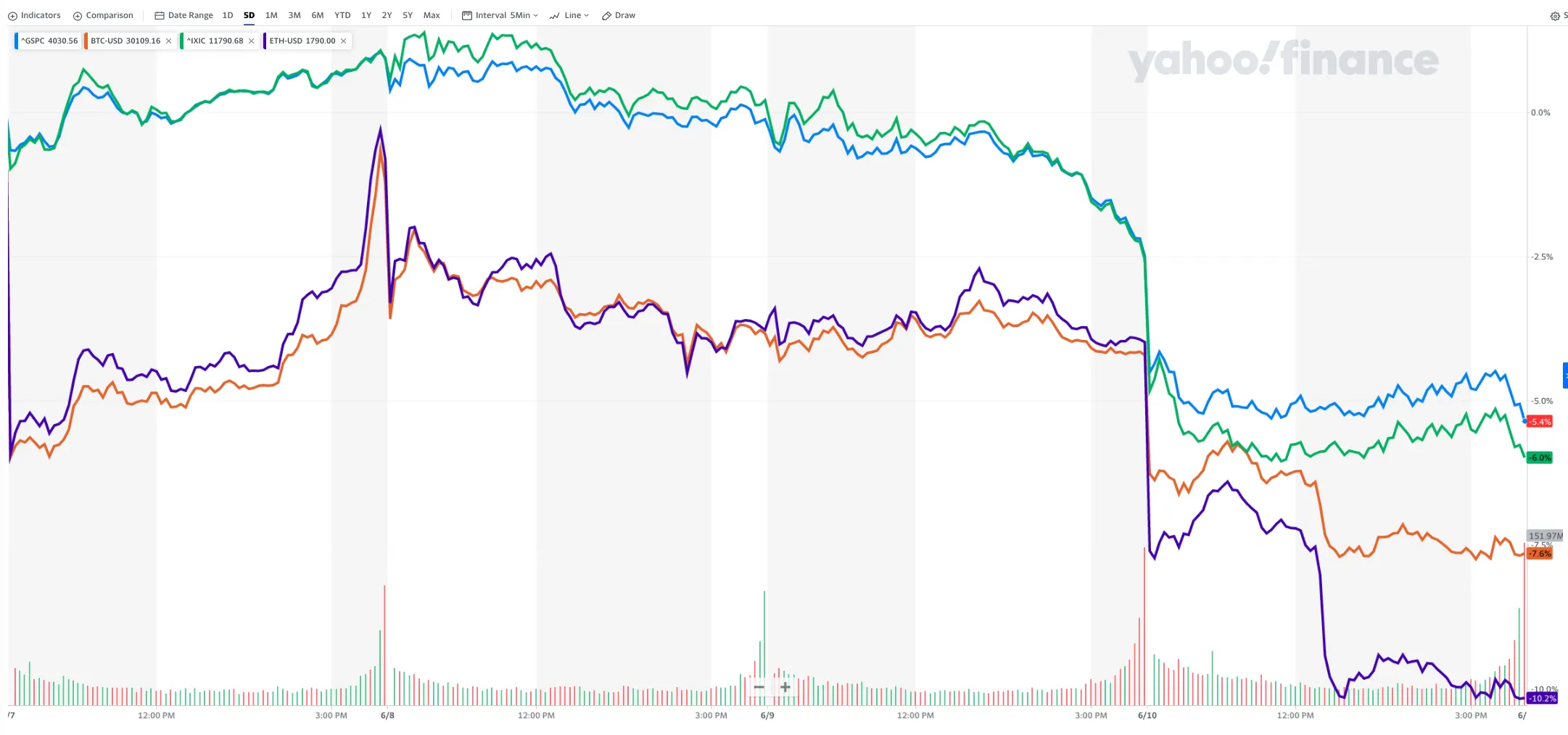
The crypto market couldn’t hold on to gains it made last week following eight consecutive weeks of decline. According to CoinMarketCap data, all of the top 10 cryptocurrencies fell in the past week by at least 3% except Cardano (ADA), which is up 6% on the week.
Market leader Bitcoin weathered the storm better than most leading coins and declined just 3% in the last seven days. It trades for $28,733 at the time of writing.
Ethereum wasn’t as lucky. The No. 2 cryptocurrency by market capitalization fell 11% over the week and currently trades for $1,579. That was despite the long-awaited Ethereum "Merge" to proof-of-stake got one step closer to its expected August completion when the merge trial successfully went live on the Ropsten testnet on Wednesday.
Binance Coin (BNB) fell 6.5% on the week, while Dogecoin (DOGE), Cronos (CRO), Litecoin (LTC), and Monero (XMR) all dropped by more than 10%.
News that moved crypto markets this week
So, what's keeping the crypto market on ice? Continued losses in the stock market, especially in tech stocks—and crypto prices have been more tied to tech stocks over the past month than they had been historically. The S&P 500 and Nasdaq both fell about 6% this week, and BTC and ETH fell right along with them.

On Friday, the U.S. CPI (Consumer Price Index) reading for May came out and was ugly: costs rose 8.6% in May compared to May 2021, the highest monthly CPI rise since 1981. Inflation in 2022 has so far been bad for Bitcoin, despite the longtime pitch that Bitcoin is a hedge against inflation.
And if the broader U.S. economic slump isn't enough of an explanation for this Crypto Winter, regulators continue to come out strongly with proposed crypto rules and guidelines.
This week, The New York State Department of Financial Services (DFS) became America’s first regulator to issue regulatory guidance for dollar-backed stablecoins. The guidance outlines the “baseline criteria” for the backing, redeemability and auditability of stablecoins.
Stablecoins, the DFS says, “must be fully backed by a reserve of assets” at the end of every business day and issuers are required to have “clear, conspicuous redemption policies,” approved in advance that would give stablecoin holders the right to redeem their digital dollars “in a timely fashion at par for the U.S. dollar.” Issuers are required to custody their assets “with U.S. state or federally chartered depository institutions and/or asset custodians.”
On Thursday, Treasury Secretary Janet Yellen warned people against including Bitcoin and other cryptocurrencies in their retirement plans, something that Fidelity is rolling out this summer with its “Digital Assets Account.” Speaking at a New York Times event in Washington, Yellen said: “It’s not something that I would recommend to most people who are saving for their retirement. To me, it’s a very risky investment.”
On Thursday, Bloomberg reported via an unnamed source that the SEC’s enforcement attorneys have been looking into whether Terraform Labs’ marketing of its now-collapsed algorithmic stablecoin, UST, violated federal investor protection rules.
Still, crypto-friendly politicians are pushing back. Senators Cynthia Lummis and Kirsten Gillibrand proposed a bill to defang the United States Securities and Executive Commission (SEC) of authority over the crypto markets while making the Commodity Futures Trading Commission (CFTC) the market’s prime regulator.
Their proposed bill, titled the Responsible Financial Innovation Act, is the most comprehensive piece of crypto legislation proposed to date and introduces many significant measures, including a provision that eliminates reporting obligations for crypto gains of $200 or less to the IRS. Presently, the bill is not expected to pass Congress but it could easily pick up momentum following the November midterm elections.
And despite the price slump, more and more people believe in the future of crypto payments: a new survey of merchants conducted by Deloitte and PayPal revealed this week that nearly 85% of executives from various U.S retailers expect digital currency payments to become “ubiquitous” in their respective industries in the next five years. The survey polled around 2,000 executives in sectors like cosmetics, digital goods, electronics, fashion, food & beverage, home/garden, hospitality, leisure, and transportation.

